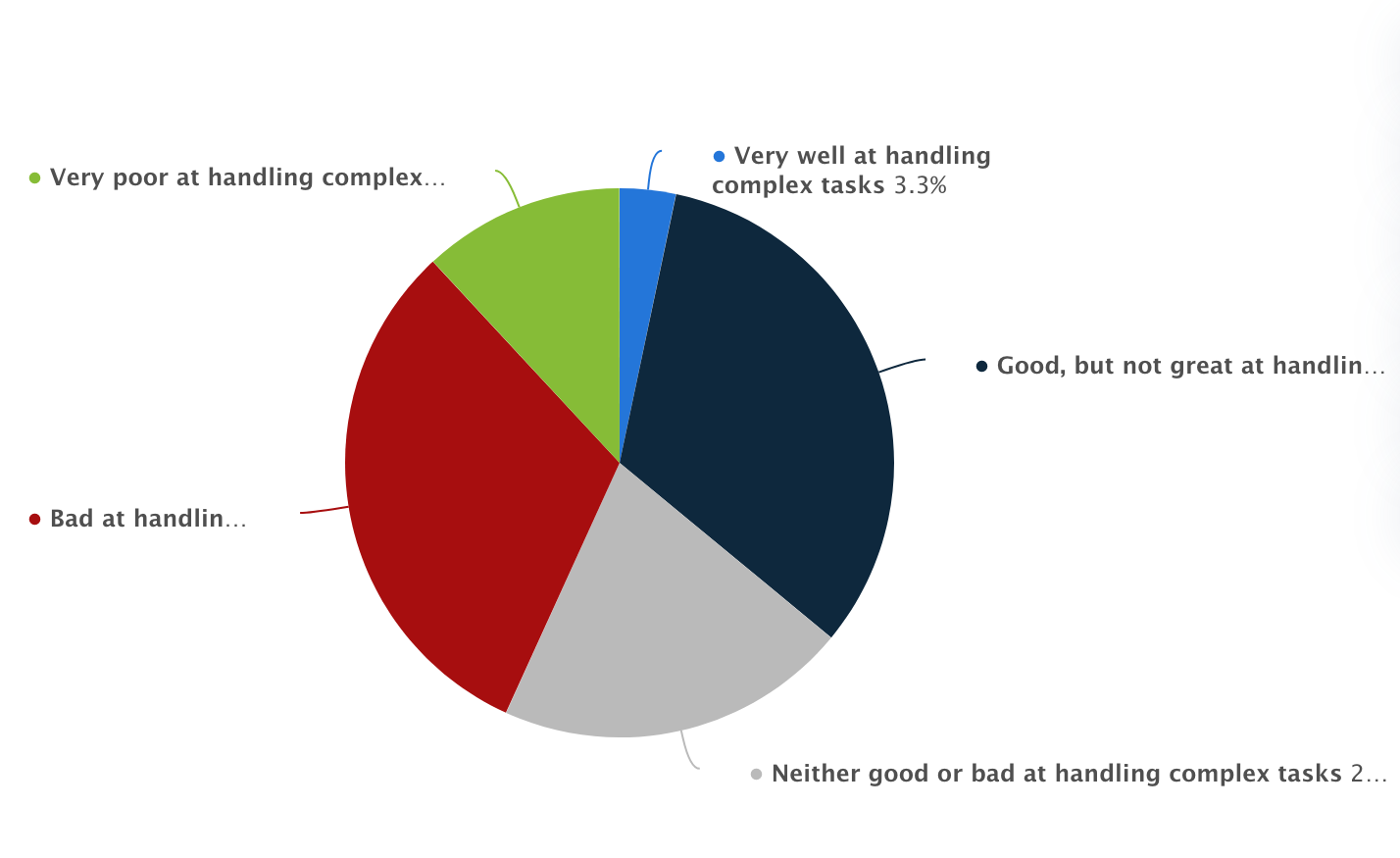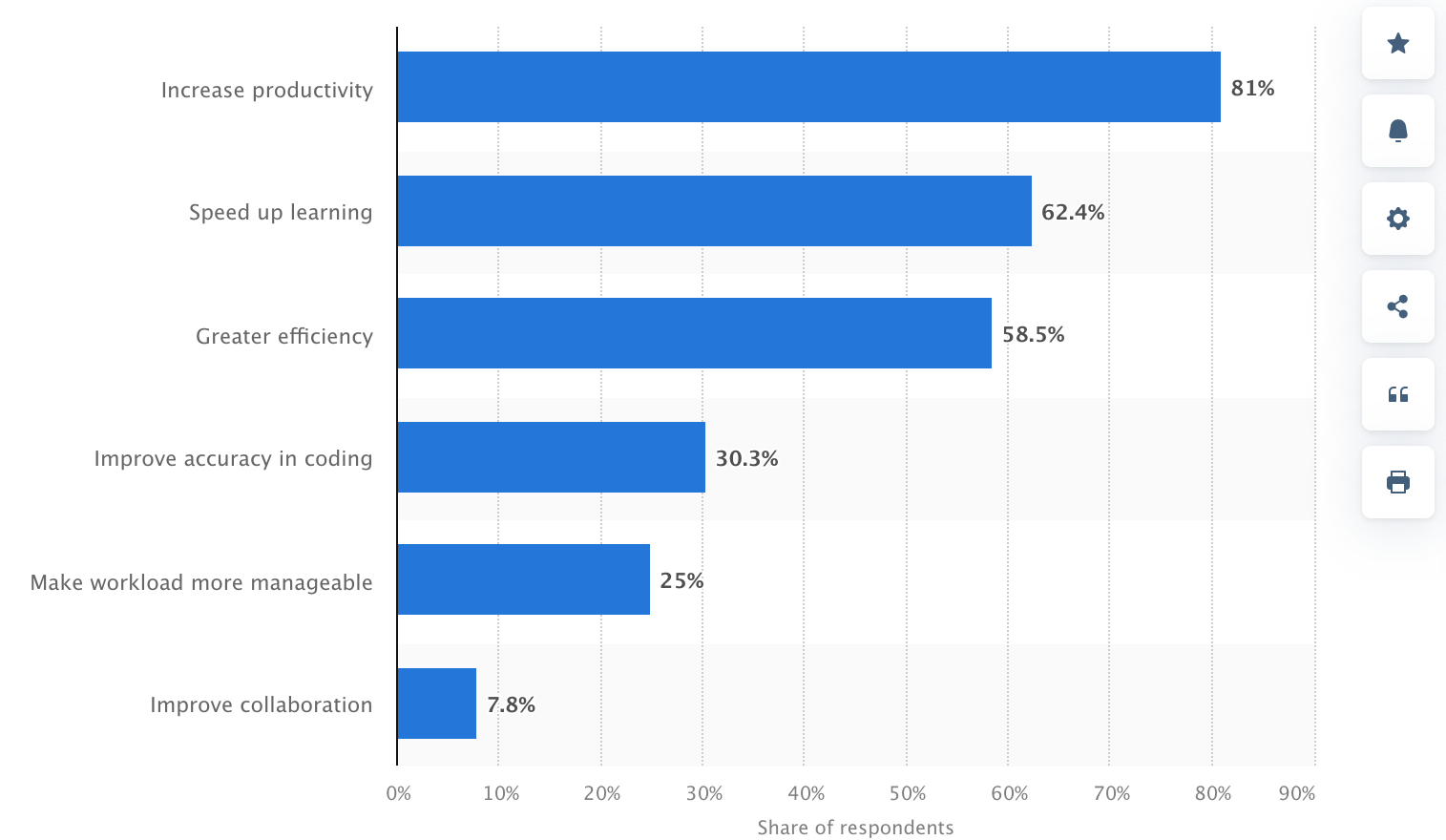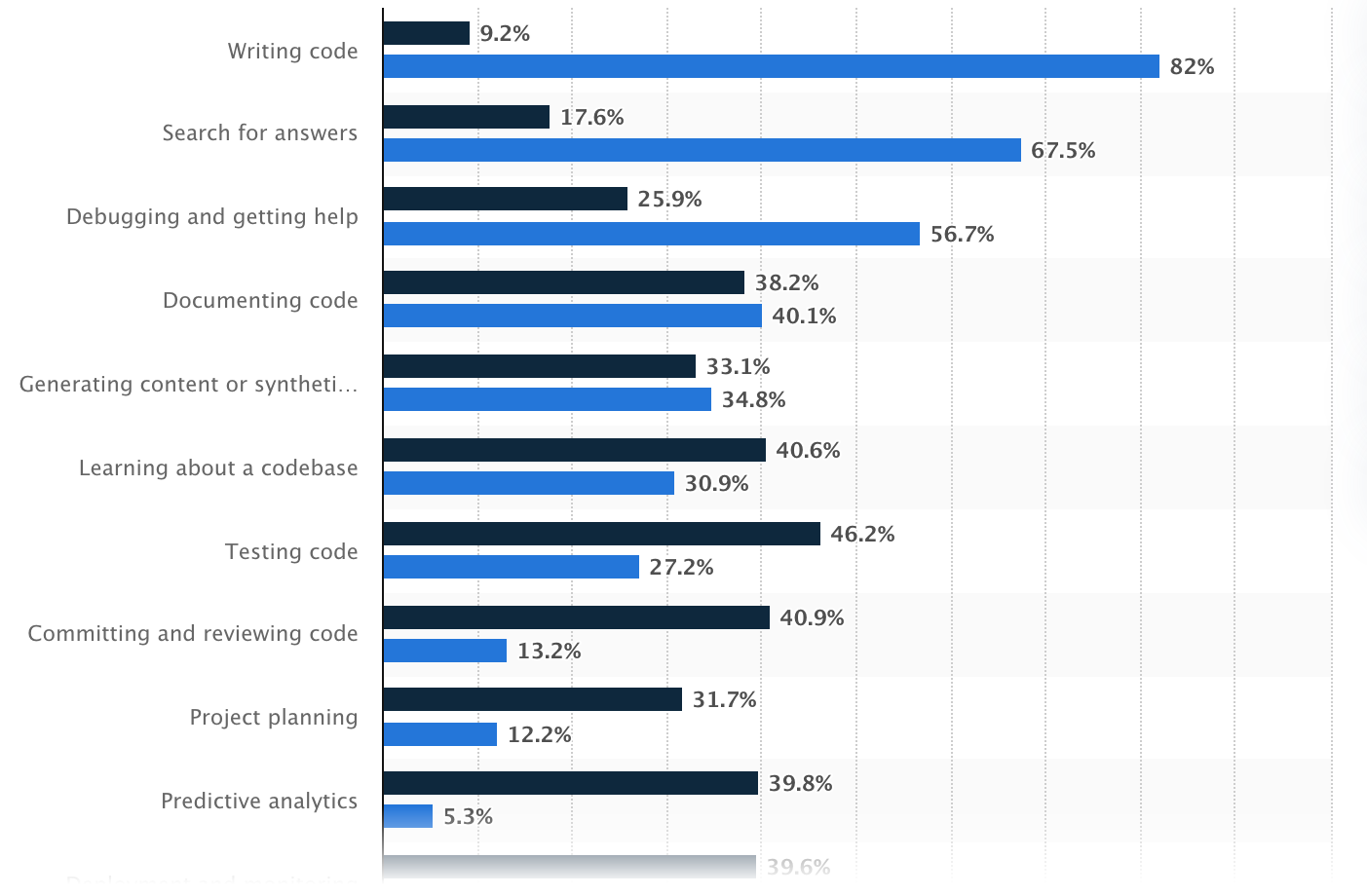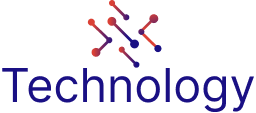
During the last 2-3 years, synthetic intelligence (AI) brokers have turn out to be extra embedded within the software program growth course of. In keeping with Statista, three out of 4 builders, or round 75%, use GitHub Copilot, OpenAI Codex, ChatGPT, and different generative AI of their day by day chores.
Nonetheless, whereas AI reveals promise in directing software program growth duties, it creates a wave of authorized uncertainty.
Skill of Synthetic Intelligence in Managing Complicated Duties, Statista
Who owns the code written by an AI? What occurs if AI-made code infringes on another person’s mental property? And what are the privateness dangers when business information is processed by means of AI fashions?
To reply all these burning questions, we’ll clarify how AI growth is regarded from the authorized facet, particularly in outsourcing instances, and dive into all concerns firms ought to perceive earlier than permitting these instruments to combine into their workflows.
What Is AI in Customized Software program Improvement?
The marketplace for AI applied sciences is huge, amounting to round $244 billion in 2025. Usually, AI is split into machine studying and deep studying and additional into pure language processing, laptop imaginative and prescient, and extra.

In software program growth, AI instruments seek advice from clever techniques that may help or automate elements of the programming course of. They will counsel strains of code, full capabilities, and even generate whole modules relying on context or prompts offered by the developer.
Within the context of outsourcing tasks—the place pace isn’t any much less vital than high quality—AI applied sciences are shortly changing into staples in growth environments.
They elevate productiveness by taking redundant duties, lower the time spent on boilerplate code, and help builders who could also be working in unfamiliar frameworks or languages.

Advantages of Utilizing Synthetic Intelligence, Statista
How AI Instruments Can Be Built-in in Outsourcing Initiatives
Synthetic intelligence in 2025 has turn out to be the specified ability for practically all technical professions.
Whereas the uncommon bartender or plumber could not require AI mastery to the identical degree, it has turn out to be clear that including an AI ability to a software program developer’s arsenal is a should as a result of within the context of software program growth outsourcing, AI instruments can be utilized in some ways:
- Code Technology: GitHub Copilot and different AI instruments help outsourced builders in coding by making hints or auto-filling capabilities as they code.
- Bug Detection: As a substitute of ready for human verification in software program testing, AI can flag errors or dangerous code so groups can repair flaws earlier than they turn out to be irreversible points.
- Writing Assessments: AI can independently generate check instances from the code, thus the testing turns into faster and extra exhaustive.
- Documentation Assist: AI can go away feedback and draw up documentation explaining what the code does.
- Multi-language Assist: If the venture wants to change programming languages, AI can assist translate or re-write segments of code so as to decrease the necessity for specialised data for each programming language.

Hottest makes use of of AI within the growth, Statista
Authorized Implications of Utilizing AI in Customized Software program Improvement
AI instruments may be extremely useful in software program growth, particularly when outsourcing. However utilizing them additionally raises some authorized questions companies want to pay attention to, primarily round possession, privateness, and accountability.
Mental Property (IP) Points
When builders use AI instruments like GitHub Copilot, ChatGPT, or different code-writing assistants, it’s pure to ask: Who truly owns the code that will get written? This is likely one of the trickiest authorized questions proper now.
Presently, there’s no clear international settlement. On the whole, AI doesn’t personal something, and the developer who makes use of the device is taken into account the “creator,” nonetheless, this will range.
The catch is that AI instruments be taught from tons of present code on the web. Generally, they generate code that’s very comparable (and even equivalent) to the code they had been skilled on, together with open-source tasks.
If that code is copied too carefully, and it’s beneath a strict open-source license, you possibly can run into authorized issues, particularly in case you didn’t notice it or observe the license guidelines.
Outsourcing could make it much more problematic. In case you’re working with an outsourcing crew they usually use AI instruments throughout growth, you could be additional clear in your contracts:
- Who owns the ultimate code?
- What occurs if the AI device by chance reuses licensed code?
- Is the outsourced crew allowed to make use of AI instruments in any respect?
To 100% keep on the secure facet, you’ll be able to:
- Be certain contracts clearly state who owns the code.
- Double-check that the code doesn’t violate any licenses.
- Think about using instruments that run regionally or restrict what the AI sees to keep away from leaking or copying restricted content material.
Information Safety and Privateness
When utilizing AI instruments in software program growth, particularly in outsourcing, one other main consideration is information privateness and safety. So what’s the chance?

The vast majority of AI instruments like ChatGPT, Copilot, and others typically run within the cloud, which implies the knowledge builders put into them could also be transmitted to outer servers.
If builders copy and paste proprietary code, login credentials, or business information into these instruments, that data may very well be retained, reused, and later revealed. The scenario turns into even worse if:
- You’re giving confidential enterprise information
- Your venture issues buyer or person particulars
- You’re in a regulated trade reminiscent of healthcare or finance
So what does the regulation say concerning it? Certainly, completely different international locations have completely different rules, however probably the most noticeable are:
- GDPR (Europe): In easy phrases, GDPR protects private information. In case you collect information from folks within the EU, it’s important to clarify what you’re gathering, why you want it, and get their permission first. Folks can ask to see their information, rectify something flawed, or have it deleted.
- HIPAA (US, healthcare): HIPAA covers non-public well being data and medical information. Submitting to HIPAA, you’ll be able to’t simply paste something associated to affected person paperwork into an AI device or chatbot—particularly one which runs on-line. Additionally, in case you work with different firms (outsourcing groups or software program distributors), they should observe the identical decrees and signal a particular settlement to make all of it authorized.
- CCPA (California): CCPA is a privateness regulation that offers folks extra management over their private information. If your small business collects information from California residents, it’s important to allow them to know what you’re gathering and why. Folks can ask to see their information, have it deleted, or cease you from sharing or promoting it. Even when your organization is predicated some place else, you continue to should observe CCPA in case you’re processing information from folks in California.
The obvious and logical query right here is easy methods to defend information. First, don’t put something delicate (passwords, buyer information, or non-public firm information) into public AI instruments until you’re positive they’re secure.
For tasks that concern confidential data, it’s higher to make use of AI assistants that run on native computer systems and don’t ship something to the web.
Additionally, take an excellent have a look at the contracts with any outsourcing companions to verify they’re following the appropriate practices for holding information secure.
Accountability and Duty
AI instruments can perform many duties however they don’t take accountability when one thing goes flawed. The blame nonetheless falls on folks: the builders, the outsourcing crew, and the enterprise that owns the venture.

If the code has a flaw, creates a security hole, or causes injury, it’s not the AI’s guilt—it’s the folks utilizing it who’re accountable. If nobody takes possession, small compromises can flip into giant (and costly) points.
To keep away from this case, companies want clear instructions and human oversight:
- All the time evaluation AI-generated code. It’s simply a place to begin, not a completed product. Builders nonetheless must probe, debug, and confirm each single half.
- Assign accountability. Be it an in-house crew or an outsourced accomplice, make certain somebody is clearly answerable for high quality management.
- Embrace AI in your contracts. Your settlement with an outsourcing supplier ought to say:
- Whether or not they can apply AI instruments.
- Who’s answerable for reviewing the AI’s work.
- Who pays for fixes if one thing goes flawed due to AI-generated code.
- Maintain a file of AI utilization. Doc when and the way AI instruments are utilized, particularly for main code contributions. That approach, if issues emerge, you’ll be able to hint again what occurred.
Case Research and Examples
AI in software program growth is already a standard follow utilized by many tech giants although statistically, smaller firms with fewer workers are extra possible to make use of synthetic intelligence than bigger firms.
Beneath, we have now compiled some real-world examples that present how completely different companies are making use of AI and the teachings they’re studying alongside the way in which.
Nabla (Healthcare AI Startup)
Nabla, a French healthtech firm, built-in GPT-3 (through OpenAI) to help medical doctors with writing medical notes and summaries throughout consultations.

How they use it:
- AI listens to patient-doctor conversations and creates structured notes.
- The time medical doctors spend on admin work visibly shrinks.
Authorized & privateness actions:
- As a result of they function in a healthcare setting, Nabla deliberately selected to not use OpenAI’s API instantly because of issues about information privateness and GDPR compliance.
- As a substitute, they constructed their very own safe infrastructure utilizing open-source fashions like GPT-J, hosted regionally, to make sure no affected person information leaves their servers.
Lesson discovered: In privacy-sensitive industries, utilizing self-hosted or non-public AI fashions is usually a safer path than counting on business cloud-based APIs.
Replit and Ghostwriter
Replit, a collaborative on-line coding platform, developed Ghostwriter, its personal AI assistant much like Copilot.
The way it’s used:
- Ghostwriter helps customers (together with inexperienced persons) write and full code proper within the browser.
- It’s built-in throughout Replit’s growth platform, typically utilized in training and startups.
Problem:
- Replit has to steadiness ease of use with license compliance and transparency.
- The corporate offers disclaimers encouraging customers to evaluation and edit the generated code, underlining it is just a tip.
Lesson discovered: AI-generated code is highly effective however not at all times secure to make use of “as is.” Even platforms that construct AI instruments themselves push for human evaluation and warning.
Amazon’s Inner AI Coding Instruments
Amazon has developed its personal inner AI-powered instruments, much like Copilot, to help its builders.

How they use it:
- AI helps builders write and evaluation code throughout a number of groups and companies.
- It’s used internally to enhance developer productiveness and pace up supply.
Why they don’t use exterior instruments like Copilot:
- Amazon has strict inner insurance policies round mental property and information privateness.
- They like to construct and host instruments internally to sidestep authorized dangers and defend proprietary code.
Lesson discovered: Giant enterprises typically keep away from third-party AI instruments because of issues about IP leakage and lack of management over vulnerable information.
Learn how to Safely Use AI Instruments in Outsourcing Initiatives: Normal Suggestions
Utilizing AI instruments in outsourced growth can carry quicker supply, decrease prices, and coding productiveness. However to do it safely, firms must arrange the appropriate processes and protections from the beginning.
First, it’s vital to make AI utilization expectations clear in contracts with outsourcing companions. Agreements ought to specify whether or not AI instruments can be utilized, beneath what circumstances, and who’s answerable for reviewing and validating AI-generated code.
These contracts must also embrace sturdy mental property clauses, spelling out who owns the ultimate code and what occurs if AI by chance introduces open-source or third-party licensed content material.
Information safety is one other important concern. If builders use AI instruments that ship information to the cloud, they need to by no means enter delicate or proprietary data until the device complies with GDPR, HIPAA, or CCPA.
In extremely regulated industries, it’s at all times safer to make use of self-hosted AI fashions or variations that run in a managed surroundings to reduce the chance of knowledge openness.
To keep away from authorized and high quality points, firms must also implement human oversight at each stage. AI instruments are nice for recommendation, however they don’t perceive enterprise context or authorized necessities.
Builders should nonetheless check, audit, and reanalyze all code earlier than it goes stay. Establishing a code evaluation workflow the place senior engineers double-check AI output ensures security and accountability.
It’s additionally clever to doc when and the way AI instruments are used within the growth course of. Holding a file helps hint again the supply of any future defects or authorized issues and reveals good religion in regulatory audits.

Lastly, make certain your crew (or your outsourcing accomplice’s crew) receives fundamental coaching in AI finest practices. Builders ought to perceive the restrictions of AI ideas, easy methods to detect licensing dangers, and why it’s vital to validate code earlier than transport it.
FAQ
Q: Who owns the code generated by AI instruments?
Possession often goes to the corporate commissioning the software program—however provided that that’s clearly said in your settlement. The complication comes when AI instruments generate code that resembles open-source materials. If that content material is beneath a license, and it’s not attributed correctly, it might elevate mental property points. So, clear contracts and guide checks are key.
Q: Is AI-generated code secure to make use of as-is?
Not at all times. AI instruments can by chance reproduce licensed or copyrighted code, particularly in the event that they had been skilled on public codebases. Whereas the ideas are helpful, they need to be handled as beginning factors—builders nonetheless must evaluation, edit, and confirm the code earlier than it’s used.
Q: Is it secure to enter delicate information into AI instruments like ChatGPT?
Normally, no. Except you’re utilizing a personal or enterprise model of the AI that ensures information privateness, you shouldn’t enter any confidential or proprietary data. Public instruments course of information within the cloud, which might expose it to privateness dangers and regulatory violations.
Q: What information safety legal guidelines ought to we think about?
This will depend on the place you use and what sort of information you deal with. In Europe, the GDPR requires consent and transparency when utilizing private information. Within the U.S., HIPAA protects medical information, whereas CCPA in California offers customers management over how their private data is collected and deleted. In case your AI instruments contact delicate information, they need to adjust to these rules.
Q: Who’s accountable if AI-generated code causes an issue?
Finally, the accountability falls on the event crew—not the AI device. Which means whether or not your crew is in-house or outsourced, somebody must validate the code earlier than it goes stay. AI can pace issues up, however it could’t take accountability for errors.
Q: How can we safely use AI instruments in outsourced tasks?
Begin by placing every thing in writing: your contracts ought to cowl AI utilization, IP possession, and evaluation processes. Solely use trusted instruments, keep away from feeding in delicate information, and ensure builders are skilled to make use of AI responsibly. Most significantly, maintain a human within the loop for high quality assurance.
Q: Does SCAND use AI for software program growth?
Sure, however offered that the shopper agrees. If public AI instruments are licensed, we use Microsoft Copilot in VSCode and Cursor IDE, with fashions like ChatGPT 4o, Claude Sonnet, DeepSeek, and Qwen. If a shopper requests a personal setup, we use native AI assistants in VSCode, Ollama, LM Studio, and llama.cpp, with every thing saved on safe machines.
Q: Does SCAND use AI to check software program?
Sure, however with permission from the shopper. We use AI instruments like ChatGPT 4o and Qwen Imaginative and prescient for automated testing and Playwright and Selenium for browser testing. When required, we routinely generate unit assessments utilizing AI fashions in Copilot, Cursor, or regionally out there instruments like Llama, DeepSeek, Qwen, and Starcoder.

